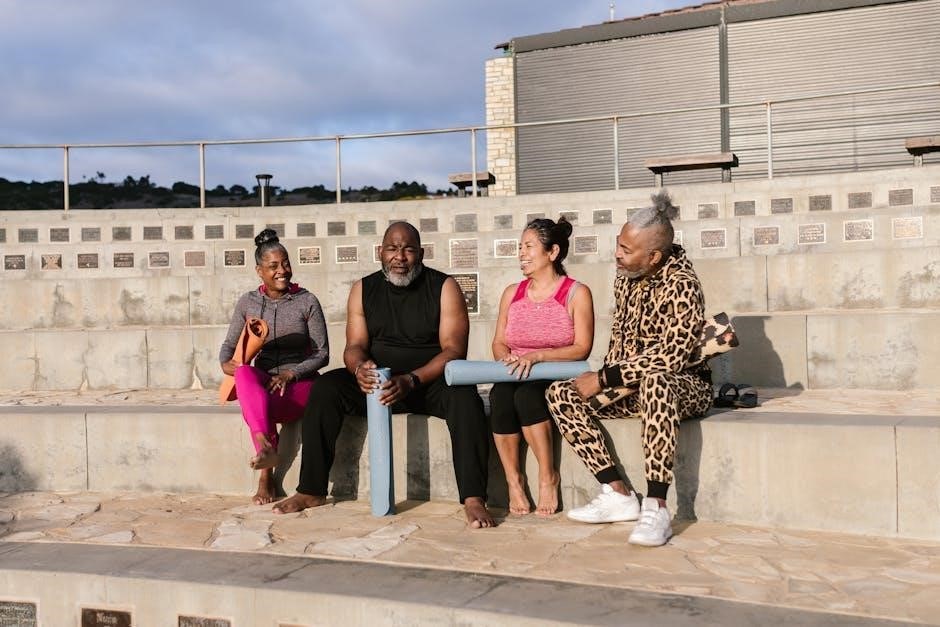Cultural diversity in health and illness refers to the variation in beliefs, practices, and values across different cultures regarding health, disease, and healthcare. Understanding these differences is crucial for providing effective, patient-centered care, as cultural beliefs often shape patients’ perceptions of illness, treatment preferences, and interactions with healthcare providers. Cultural diversity also influences health outcomes, with disparities often arising from misunderstandings or lack of cultural awareness. Addressing these disparities requires a deep appreciation of how culture impacts health behaviors and the development of culturally sensitive care practices. By recognizing and respecting these differences, healthcare systems can improve communication, trust, and overall quality of care, ensuring equitable health outcomes for all.
Overview of Cultural Diversity in Healthcare
Cultural diversity in healthcare encompasses the varied beliefs, practices, and values of patients from different cultural backgrounds. It significantly influences patient-provider interactions, treatment adherence, and health outcomes. Cultural competence is essential to address these differences effectively. Language barriers, traditional healing practices, and differing health beliefs pose challenges. Understanding and respecting these aspects fosters trust and improves care quality, ensuring equitable health outcomes for diverse populations.
The Importance of Cultural Awareness in Health and Illness
Cultural awareness is vital in healthcare as it enables providers to understand and respect patients’ beliefs, values, and practices. This understanding improves communication and trust, leading to better health outcomes; Cultural competence helps address health disparities by tailoring care to individual needs. It fosters patient-centered care, ensuring that diverse populations receive equitable and effective treatment, enhancing overall satisfaction and well-being.
Theoretical Foundations of Cultural Diversity
Theoretical foundations of cultural diversity in health and illness include frameworks like cultural competence and social determinants of health. These theories guide understanding of how culture shapes health behaviors, influencing care delivery and outcomes. They emphasize the need for tailored approaches to address diverse patient needs effectively.
Cultural Competence Models in Healthcare

Cultural competence models in healthcare provide frameworks for understanding and addressing diverse patient needs. These models emphasize awareness, knowledge, and skills to deliver care that respects cultural differences. Key models include the Transcultural Nursing Model and the Multicultural Healthcare Model, which focus on patient-centered care and equity. They promote communication, trust, and shared decision-making, enhancing health outcomes and patient satisfaction. Continuous self-assessment and learning are essential for healthcare providers to refine their cultural competence. Such models foster inclusive care environments, ensuring all patients receive tailored, respectful treatment. By integrating these models, healthcare systems can reduce disparities and improve overall quality of care. Cultural competence is a cornerstone of modern healthcare, enabling providers to meet the unique needs of diverse populations effectively. It ensures that care is not only medically appropriate but also culturally sensitive, fostering better patient-provider relationships and outcomes. Ultimately, cultural competence models are vital for creating equitable healthcare systems that value and respect all patients. They serve as a foundation for addressing the complexities of cultural diversity in health and illness. By adopting these models, healthcare organizations can promote inclusivity and deliver high-quality care to everyone. Cultural competence is an ongoing journey that requires commitment, education, and practice. It is essential for building trust and improving health outcomes in diverse patient populations. Healthcare providers must strive for cultural competence to meet the evolving needs of a globalized world. Cultural competence models guide this journey, ensuring care is both effective and respectful. They are indispensable in fostering a culturally sensitive healthcare system that honors the diversity of all individuals. Embracing these models is crucial for advancing healthcare equity and delivering care that truly matters. Cultural competence is not just a goal but a necessity in modern healthcare. It ensures that no patient is left behind due to cultural barriers. Cultural competence models are the pathway to inclusive, equitable care for all. They empower healthcare providers to navigate cultural differences with confidence and sensitivity. By adhering to these models, healthcare organizations can achieve their mission of improving health outcomes for everyone. Cultural competence is the key to unlocking better care in a diverse world. It is a commitment to understanding and respecting the cultural backgrounds of all patients. Healthcare providers must embrace cultural competence to deliver care that truly makes a difference. Cultural competence models are essential tools for achieving this vision. They provide the guidance needed to navigate the complexities of cultural diversity in healthcare. By integrating these models into practice, healthcare systems can ensure that all patients receive the care they deserve. Cultural competence is a journey, not a destination, requiring continuous learning and growth. It is through this journey that healthcare providers can truly make a positive impact on diverse patient populations. Cultural competence models are the roadmap for this journey, guiding healthcare professionals toward culturally sensitive care. They are vital for creating a healthcare system that values and respects all individuals. Embracing cultural competence models is essential for improving health outcomes and patient satisfaction. They are the foundation upon which inclusive care is built, ensuring that no patient is marginalized or overlooked. Cultural competence models are the future of healthcare, leading the way toward equitable, patient-centered care. They are the tools healthcare providers need to deliver care that honors the diversity of all patients. By adopting these models, healthcare organizations can create a more inclusive and compassionate healthcare system. Cultural competence models are the pathway to achieving this vision. They are the key to unlocking better care for diverse patient populations. Healthcare providers must embrace cultural competence to deliver care that truly makes a difference. Cultural competence models are essential for navigating the complexities of cultural diversity in healthcare. They provide the guidance needed to ensure that all patients receive respectful and effective care. By integrating these models into practice, healthcare systems can achieve their mission of improving health outcomes for everyone. Cultural competence is a commitment to understanding and respecting the cultural backgrounds of all patients. It is a journey that requires continuous learning and growth. Through this journey, healthcare providers can make a positive impact on diverse patient populations. Cultural competence models are the roadmap for this journey, guiding professionals toward culturally sensitive care. They are vital for creating a healthcare system that values and respects all individuals. Embracing cultural competence models is essential for improving health outcomes and patient satisfaction. They are the foundation upon which inclusive care is built, ensuring that no patient is marginalized or overlooked. Cultural competence models are the future of healthcare, leading the way toward equitable, patient-centered care. They are the tools healthcare providers need to deliver care that honors the diversity of all patients. By adopting these models, healthcare organizations can create a more inclusive and compassionate healthcare system. Cultural competence models are the pathway to achieving this vision. They are the key to unlocking better care for diverse patient populations. Healthcare providers must embrace cultural competence to deliver care that truly makes a difference. Cultural competence models are essential for navigating the complexities of cultural diversity in healthcare. They provide the guidance needed to ensure that all patients receive respectful and effective care. By integrating these models into practice, healthcare systems can achieve their mission of improving health outcomes for everyone. Cultural competence is a commitment to understanding and respecting the cultural backgrounds of all patients. It
Social Determinants of Health and Cultural Influences
Social determinants of health, such as socioeconomic status, education, and environment, are deeply influenced by cultural factors. Cultural beliefs and practices shape health behaviors, access to care, and outcomes. Understanding these influences is critical to addressing health disparities and promoting equity. Cultural diversity impacts how individuals perceive health and illness, influencing their responses to prevention, treatment, and care. By recognizing these intersections, healthcare systems can better address the unique needs of diverse populations; Cultural influences on social determinants highlight the need for tailored interventions to reduce disparities and improve health outcomes. Addressing these factors ensures more equitable and inclusive healthcare for all. Cultural sensitivity is vital in navigating the complex relationship between social determinants and health. It enables healthcare providers to deliver care that respects and addresses the cultural contexts of patients’ lives. By integrating cultural awareness, healthcare systems can better meet the needs of diverse populations. Cultural influences on social determinants underscores the importance of a holistic approach to health. It emphasizes the need for policies and practices that account for cultural diversity. Ultimately, addressing these factors is essential for achieving health equity and improving outcomes for all. Cultural diversity must be considered in all efforts to address social determinants of health. It is a cornerstone of equitable and effective healthcare. By understanding and addressing these cultural influences, healthcare systems can create a more inclusive and compassionate environment. Cultural diversity is not just a challenge, but an opportunity to improve care for all. Embracing these influences leads to better health outcomes and a more equitable healthcare system. Cultural diversity is a vital consideration in addressing social determinants of health. It requires a deep understanding of how culture shapes health behaviors and outcomes. By addressing these factors, healthcare providers can deliver care that is both effective and respectful. Cultural diversity is a key component of a holistic approach to health. It emphasizes the need for culturally sensitive policies and practices. Ultimately, cultural diversity is essential for achieving health equity and improving outcomes. It is a critical factor in addressing social determinants of health. By understanding and addressing these influences, healthcare systems can create a more inclusive environment. Cultural diversity is not just a challenge, but an opportunity to enhance care. Embracing these influences leads to better health outcomes and equity. Cultural diversity is a vital aspect of addressing social determinants of health. It requires a nuanced understanding of how culture impacts health. By addressing these factors, healthcare systems can deliver more effective and compassionate care. Cultural diversity is essential for achieving health equity and improving outcomes. It is a cornerstone of a holistic approach to health. By understanding and addressing these influences, healthcare providers can create a more inclusive environment. Cultural diversity is not just a challenge, but a key to better care. Embracing these influences leads to equitable and effective healthcare.
Cultural Communication in Healthcare Settings
Cultural communication in healthcare involves understanding diverse languages, beliefs, and practices to ensure effective interactions. Language barriers and cultural nuances can impact care delivery, requiring interpreters and culturally sensitive approaches. Healthcare providers must navigate these differences to build trust and ensure accurate diagnosis and treatment. Cultural communication fosters mutual understanding, improving patient satisfaction and health outcomes.
Language Barriers and Their Impact on Patient Care
Language barriers significantly impede effective communication in healthcare, leading to misunderstandings, misdiagnosis, and non-adherence to treatment. Patients with limited proficiency in the dominant language often experience delays in care and reduced satisfaction. Healthcare providers must address these challenges by using professional interpreters or bilingual staff. Without adequate communication, patients may feel isolated, anxious, or distrustful, compromising their care quality. Solutions like interpreter services and translated materials can bridge these gaps, ensuring equitable access to care and improving health outcomes.
Nonverbal Communication Across Cultures
Nonverbal communication, such as gestures, eye contact, and body language, varies widely across cultures and can significantly impact patient-provider interactions. Misinterpretation of nonverbal cues may lead to misunderstandings, affecting trust and care quality. Cultural differences in personal space and physical touch also influence communication dynamics. Healthcare providers must remain sensitive to these variations to ensure respectful and effective care, fostering a welcoming environment for diverse patient populations.
Mental Health and Cultural Diversity
Cultural diversity influences mental health perceptions, diagnosis, and treatment approaches. Cultural beliefs shape understanding of mental illness, impacting stigma, help-seeking behaviors, and therapeutic outcomes. Diverse practices and values must be considered to provide culturally sensitive care, ensuring equitable mental health services for all populations.
Cultural Perspectives on Mental Health and Illness
Cultural perspectives significantly shape understanding and treatment of mental health and illness. Diverse beliefs, values, and practices influence how mental health is perceived, diagnosed, and addressed. Examples include varying views on causation, such as spiritual or biological explanations, and preferences for traditional vs. modern treatments. These differences impact stigma, help-seeking behaviors, and therapeutic outcomes, underscoring the need for culturally sensitive care.

Traditional Healing Practices and Their Role in Modern Healthcare
Traditional healing practices, deeply rooted in cultural beliefs, continue to play a significant role in modern healthcare. These practices often emphasize holistic approaches, addressing physical, emotional, and spiritual well-being. While they may complement modern medicine, integrating them requires cultural sensitivity and understanding. Healthcare providers must respect patients’ preferences and bridge traditional methods with evidence-based care to enhance trust and improve outcomes.

Legal and Ethical Considerations
Cultural diversity in healthcare requires adherence to legal and ethical standards, ensuring equitable care for all patients. Laws protect patients’ rights, while ethical guidelines promote cultural competence and respect for diverse beliefs and practices. These principles ensure fairness and respectful care delivery across diverse populations.
Cultural Sensitivity and Patient Rights
Cultural sensitivity in healthcare ensures respect for patients’ beliefs, values, and practices, upholding their rights to equitable care. Legal frameworks protect patients from discrimination, ensuring access to care regardless of cultural background. Respecting cultural practices fosters trust and cooperation, empowering patients to make informed decisions. Culturally sensitive care honors patient autonomy, ensuring dignity and justice in all interactions. This approach is vital for delivering person-centered care.
Ethical Challenges in Cross-Cultural Healthcare

Navigating cultural differences in healthcare presents ethical challenges, such as balancing respect for cultural practices with medical advice. Cultural beliefs may conflict with treatment recommendations, raising questions about informed consent and patient autonomy. Language barriers and stereotypes can also hinder ethical decision-making. Addressing these issues requires cultural competence and a commitment to fairness, ensuring care aligns with both medical standards and patient values. Ethical frameworks must guide providers to respect diversity while upholding universal principles of care.

Consumer Perspectives on Cultural Diversity
Patients’ cultural backgrounds shape their health beliefs, behaviors, and expectations. Cultural sensitivity fosters trust and satisfaction, while cultural insensitivity can lead to misunderstandings and poor health outcomes. Understanding patient values is key to delivering care that aligns with their preferences and improves overall well-being. Cultural diversity in healthcare must be prioritized to meet the unique needs of diverse populations.
Patient Narratives and Cultural Identity
Patient narratives reflect how cultural identity shapes health beliefs and behaviors. Storytelling reveals personal meanings of illness, influencing treatment preferences and trust in healthcare providers. Cultural identity impacts communication, with diverse patients often seeking care that aligns with their values. Understanding these narratives helps providers deliver culturally sensitive care, fostering trust and improving health outcomes. Patient-centered care thrives when cultural stories are respected and integrated into care plans.

Future Directions in Cultural Diversity and Healthcare
Cultural Appropriation in Healthcare Practices
Cultural appropriation in healthcare refers to the unethical adoption of cultural practices or symbols without proper understanding or respect for their origins. This can lead to misuse of traditional healing methods or misrepresentation of cultural values. Such practices may unintentionally offend patients, undermining trust in the healthcare system. It is essential for providers to approach cultural elements with sensitivity and ensure respectful integration into care practices to avoid perpetuating stereotypes or cultural insensitivity.